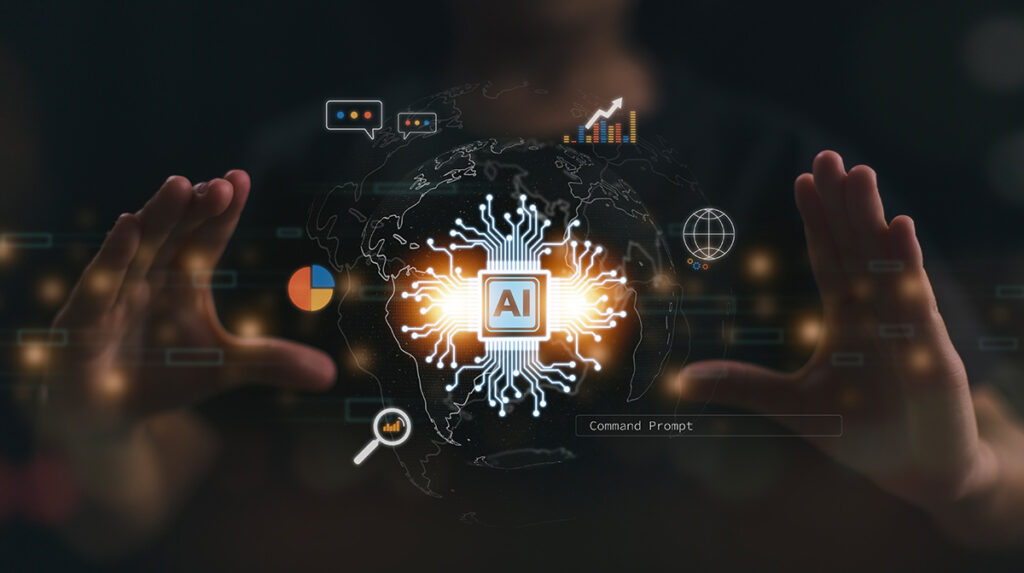The growth of artificial intelligence has been on the rise. Companies are steadily turning towards AI to gain a strategic advantage in today’s highly competitive business landscape.
However, have you ever thought of a possibility where AI ideas could transform your business?
Yes, it’s true and possible. Thanks to the advancement and boom of AI technologies over the short-term, today, we have the convenience and tools required to leverage AI projects for business transformation.
But, Is AI Necessary For Business?
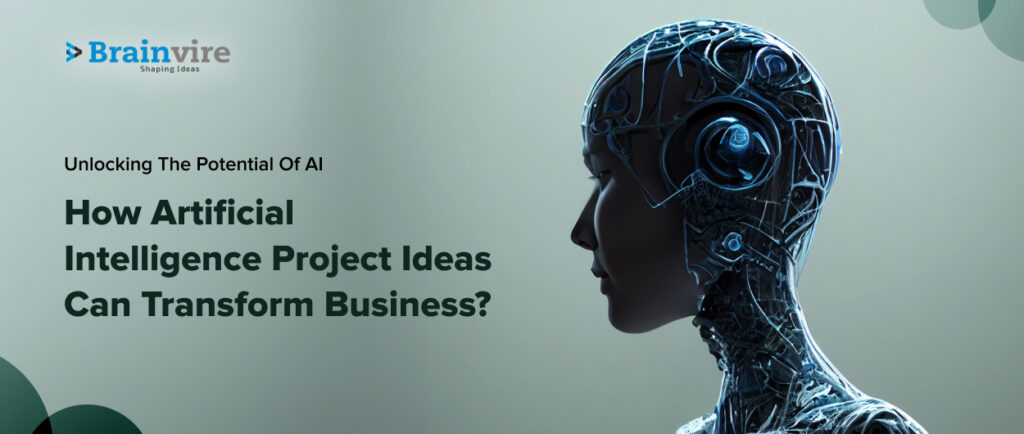
AI unlocks your business’s potential and takes it to the next level. Stats suggest that AI can streamline your operations’ speed and add up to 20% YoY revenue.
Today, AI in top industries is reforming operations in several ways, ranging from better customer services to improved operations monitoring. However, you must first develop transformation ideas to leverage the potential of AI.
This article explores some AI project ideas for business transformation. So continue reading as we demonstrate how AI services can unlock enormous value for businesses in various industries.
Applications of AI In Business Transformation
AI is revolutionizing businesses in all sectors, and this trend will only accelerate. Companies can save time and money using AI to automate repetitive tasks, enhance customer service, and fine-tune decision-making.
Here we will explore how AI is used in business transformation across four key areas:
- Enhancing customer experience,
- Improving business operations and efficiency
- Innovating new products and services
- Optimizing business strategies and decision-making.
Let’s understand more about these applications in detail in this section.
Enhanced Customer Experience:
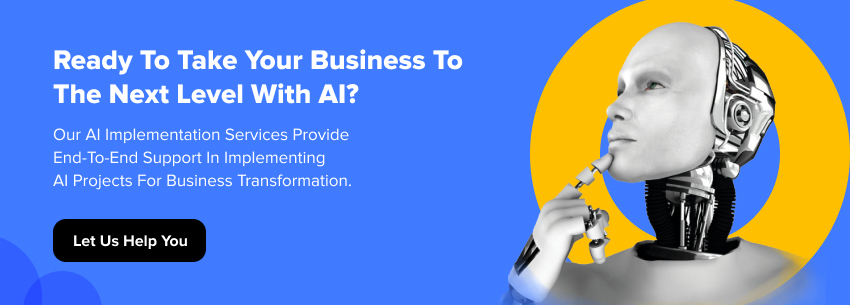
One of the main advantages of AI in business transformation is that it can improve the experience that customers have with a company. Artificial intelligence (AI) can increase customer satisfaction and loyalty by analyzing customer data and recommending tailored solutions.
Chatbots, computer programs designed to mimic human conversation, are one application of artificial intelligence in this area. Customers can use chatbots to get answers to their questions, recommendations on what to buy, and help with the checkout process. They can process many requests simultaneously, allowing human agents to focus on more intricate problems.
Personalized advertising is another area where AI can make a difference for customers. Artificial intelligence algorithms can learn about customers’ preferences and buying habits and make recommendations based on that information. Because of this, customers are more likely to feel like their business is essential to them and to return.
Improved Business Operations and Efficiency:
By automating mundane and time-consuming tasks, AI empowers businesses to enhance productivity and efficiency. This results in accelerated processes that are more precise and less susceptible to errors.
Supply chain management is one area where AI is being used in operations. Businesses can improve their supply chain efficiency by using AI algorithms to analyze data on inventory, demand, and disruptions in the supply chain. This can reduce expenses, shorten delivery times, and boost productivity.
Predictive upkeep is another area where AI can help businesses. Artificial intelligence algorithms can analyze data on equipment performance to determine when maintenance is needed and send notifications to technicians ahead of schedule. As a result, you can expect less downtime, lower maintenance costs, and longer-lasting equipment.
Innovate New Products and Services:
AI can be used to invent ground-breaking new products and services, giving businesses a competitive edge. Analyzing customer data, market trends, and industry developments can reveal new product and service opportunities.
Innovation in product design is one area where AI has been used. Businesses can better cater to consumers’ wants and needs by employing AI algorithms to study their comments and actions. The result may be happier customers and more business.
Predictive analytics is another way AI can help with new ideas. Companies can determine the future success of their products and services by analyzing historical data on customer preferences, market tendencies, and technological advances. This can aid companies in prioritizing their innovation initiatives and lowering the stakes of failure.
Optimized Business Strategies and Decision-Making:
Finally, AI can help businesses perfect their approach to optimizing strategy and choice-making. Businesses can improve the quality of their decision-making by analyzing data on customer behavior, market trends, and industry developments.
Financial forecasting is one area where AI is being used strategically. Artificial Intelligence in finance can make revenue and cash flow projections by analysing past sales, costs, and market tendencies. Investment, growth, and risk management are all areas where this can aid businesses.
Predictive analytics is another way AI can help people make better choices. Businesses can foresee the results of various choices and scenarios by analyzing data on customer behavior, market trends, and industry developments. This can aid businesses in making better decisions and lessen the likelihood of failure.
Artificial Intelligence Project Ideas For Business Transformation
Artificial Intelligence exerts a profound influence on business processes in today’s high-tech world. The escalating volume of data poses challenges for organizations in analyzing and extracting insights that can effectively enhance customer understanding, streamline processes, innovate offerings, and refine operational and strategic decisions.
So now that we have an idea of AI’s possibilities and power let’s look at some artificial intelligence project ideas that could significantly alter a company’s operations.
Chatbots and Virtual Assistants For Customer Service:

Chatbots and virtual assistants powered by artificial intelligence make real-time customer interaction possible. They can respond to questions, suggest items, and help with customer purchases.
Chatbots can also be used to gather customer feedback to make the service or product better. Some potential applications of virtual assistants and chatbots are listed below:
- Customer service chatbot: Create a chatbot for customer service that can handle questions about products, services, prices, and discounts.
- Personal shopping assistant: Create a virtual assistant to make product recommendations to shoppers based on their tastes and past purchases.
- Feedback collection chatbot: Create a chatbot that can solicit product and service reviews from end users. This information can fine-tune offerings and give customers a better all-around experience.
Predictive Analytics For Supply Chain Management:

AI can help you reorganize your eCommerce data analytics with complete efficiency. It can examine supply chain data to help with inventory management, lead time reduction, and supplier efficiency. Some potential applications of predictive analytics in SCM are listed below.
- Demand forecasting: Build a machine learning model to forecast product demand using past sales data, current marketing efforts, and seasonal patterns.
- Inventory optimization: Create a machine learning model to optimize inventory levels in response to changes in demand, lead times, and suppliers’ performance levels.
- Supplier performance analysis: Create a machine learning model to evaluate supplier performance regarding on-time deliveries, product quality, and cost.
Image Recognition And Visual Search For eCommerce:
Artificial intelligence can use visual search and image recognition to help shoppers locate goods that meet their needs. Some potential applications of image recognition and visual search in online shopping are listed below.
- Visual product search: Create a visual search engine to help shoppers locate products through uploaded images or in-camera queries.
Product tagging: Tag products automatically based on attributes like color, pattern, and style using an image recognition model.
- Outfit recommendation: Building a machine learning model to suggest outfits to users based on their tastes and actions is essential to any successful ecommerce business.
Natural Language Processing For Content Creation And Marketing:

Natural Language Processing (NLP) can help businesses produce content and advertising that connects with consumers. Some potential projects involving NLP in the context of content production and promotion are:
- Content generation: Build an NLP model to write product descriptions, social media updates, and blog posts responding to customer interests and actions.
- Social media monitoring: Create a natural language processing model that can track product-related social media conversations. This can help companies gauge customer satisfaction and respond appropriately to complaints.
- Personalized marketing messages: Develop an NLP model that can generate personalized marketing messages based on customer preferences and past behavior.
Sentiment Analysis For Social Media And Customer Feedback:

Artificial intelligence can analyze customer reviews, social media posts, and other data to learn how people feel about a company’s offerings. Businesses can use this information to understand their customer’s needs better and address their concerns. Some potential topics for research involving sentiment analysis are listed below.
- Social media sentiment analysis: Create a machine learning model to examine social media posts about products and services to determine user sentiment. This can help companies gauge customer satisfaction and respond appropriately to complaints.
- Customer feedback analysis: Construct a machine learning model to examine product and service reviews from satisfied customers. Businesses can use this information to pinpoint problem areas and implement solutions.
- Competitor analysis: Analyse the competition by building a machine learning system to examine customers’ feelings about competing brands. This can aid companies in identifying their rivals and devising strategies to gain an edge over them.
Fraud Detection And Prevention Using Machine Learning:

Artificial intelligence can sift through mountains of data to find signs of fraud and stop money from being lost. Using machine learning, here are some potential areas for investigation:
- Credit card fraud detection: Create a machine learning model to identify potentially fraudulent credit card transactions by analyzing past data and customer patterns.
- Insurance fraud detection: Create a machine learning model to identify fraudulent insurance claims by analyzing past and customer actions.
- Anomaly detection: Create a machine learning model to spot out-of-the-ordinary patterns in monetary transactions like large withdrawals or unexpectedly high spending.
So now that we have an idea of the ideas, let’s look at their practical side. The following section provides an overview of implementing AI projects for business transformation.
Implementing AI Projects For Business Transformation
AI can revolutionize enterprises by enhancing customer experience, optimizing business strategies and decision-making, innovating new products and services, and improving operations and efficieImplementingon of AI projects for business transformation requires states meticulous planning and execution.
Identifying Business Goals And Challenges:

Identifying the business’s goals and challenges is the first step in implementing AI projects for business transformation. Businesses must take stock of their current procedures, pinpoint problem areas, and specify their ideal outcomes.
To better serve its clientele, a store, for instance, may create a chatbot to answer shoppers’ questions and help them make purchases. Defining the business’s objectives and obstacles is essential to ensure the AI project aligns with the business goals.
Evaluating The Feasibility Of AI Projects:
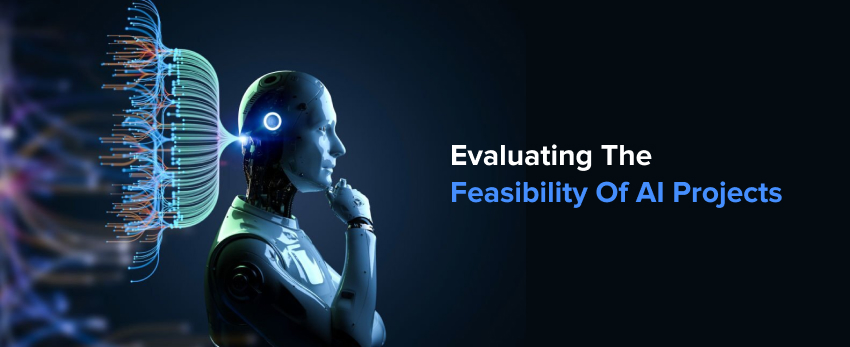
After identifying business goals and challenges, the subsequent step involves the assessment of the viability of AI initiatives. The task at hand entails evaluating the viability of the artificial intelligence initiative from a technical, operational, and financial standpoint.
The assessment of technical feasibility pertains to the examination of the accessibility of artificial intelligence technologies and resources that can be employed for the creation of artificial intelligence resolution.
Evaluating the AI solution’s impact on current business processes and systems is crucial to operational feasibility. The assessment of financial feasibility entails the calculation of expenses and gains associated with the AI initiative, as well as the evaluation of its return on investment.
Selecting The Appropriate AI Technologies And Tools:
The process of identifying suitable AI technologies and tools is of utmost importance in creating an efficient AI system that aligns with the objectives and obstacles of the enterprise.
A plethora of AI technologies and tools are at one’s disposal, including but not limited to machine learning, natural language processing, computer vision, and robotics.
It is imperative for enterprises to carefully choose suitable artificial intelligence technologies and tools that align with their distinct needs and limitations. An instance of a business endeavoring to create a chatbot for customer service may opt for natural language processing as the suitable artificial intelligence technology.
Acquiring and Preparing Data For AI Projects:
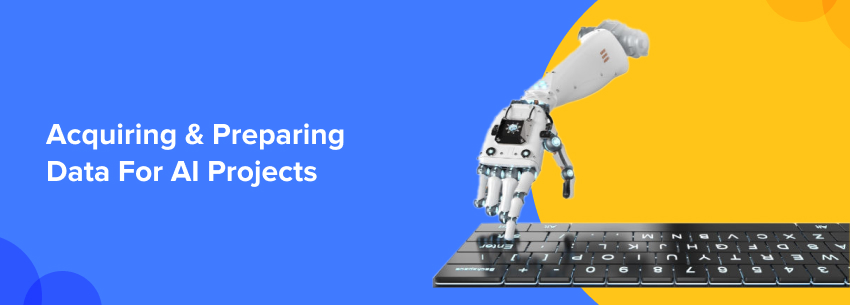
Data is the fundamental resource that propels artificial intelligence initiatives. Data acquisition and preparation is a crucial requirement for businesses undertaking AI projects.
The process involves identifying relevant data sources, acquiring and refining the data, and organizing it into a structure suitable for utilization by artificial intelligence models. The importance of utilizing high-quality data in artificial intelligence endeavors cannot be overstated, as it is crucial for developing precise and efficient AI models. Furthermore, the active involvement in identifying data sources, acquiring and refining data, and organizing it into a suitable structure is imperative for successful utilization of artificial intelligence models.
Enterprises must guarantee the precision, pertinence, and comprehensiveness of the data utilized in artificial intelligence initiatives to address the problem domain effectively.
Developing and Testing Other AI Models:
The development and testing of artificial intelligence models constitute the fundamental aspect of AI projects. The process entails the utilization of artificial intelligence technologies and tools to construct artificial intelligence models capable of resolving the business predicament.
Enterprises must carefully choose suitable AI algorithms and models to meet their particular needs and limitations. A business entity intending to create a credit card fraud detection system may employ a machine learning model, such as a decision tree or a neural network.
Evaluating AI models is of utmost importance in guaranteeing their precision and efficacy in addressing pertinent business issues. Enterprises must employ suitable evaluation metrics to assess the effectiveness of their artificial intelligence models.
The selection of evaluation metrics in AI projects is contingent upon the particular business problem and the AI technology employed.
Deploying and Integrating AI Solutions Into Existing Systems:
The integration and deployment of artificial intelligence solutions into pre-existing systems represent the ultimate phase in the execution of AI initiatives aimed at facilitating organizational metamorphosis.
The task pertains to assimilating the AI solution within the pre-existing business processes and systems. Enterprises must guarantee that their artificial intelligence (AI) solution possesses the qualities of scalability, reliability, and security. Organizations must furnish suitable training to their workforce to ensure proficient operations of the AI solution.
However, much like the perks of integrating AI into your operations, there are several challenges and considerations that you need to understand before implementing it. The following section tends to give you an insight into such operations.
Challenges and Considerations Of Implementing AI Into Your Operations

AI is becoming increasingly commonplace, from healthcare and finance to manufacturing. However, there are still many things to consider and obstacles to overcome before fully embracing AI. We’ll review the four most important problems and factors you’ll need to consider when implementing AI.
Ethical Concerns Around AI Usage:
Concerns about the ethical implications of AI’s use have surfaced as its popularity has grown. One major worry is that AI will reinforce discrimination and biases already present in society. This can happen if the algorithms used by AI systems are biased or the data used to train the models is biased.
Facial recognition technology, for instance, has been called into question due to concerns that it may be unfairly biased against people of color because it is less accurate for them. Similar criticisms have been levelled at AI-driven hiring systems for allegedly reinforcing sexism and racism.
To address these issues, we must ensure that AI systems are built with fair and unbiased algorithms and that the data used to train them is diverse and representative of the entire population. This necessitates meticulous planning and supervision throughout the AI creation, from gathering data to training and testing models.
Privacy and Security Of Sensitive Data:

Data privacy and security are other issues that arise when using AI. AI systems frequently necessitate access to massive amounts of data to train their models properly and produce reliable predictions. Names, addresses, and credit card numbers are all examples of personally identifiable information that could be included in this data set.
Both hackers and the companies that store this information pose a threat of stealing or misusing this information. Strong data protection measures like encryption and access controls can help reduce this danger. Getting users’ permission to use their data in AI systems requires being honest with them about the data collection and usage processes.
Skillset and Resource Requirements For AI Projects:
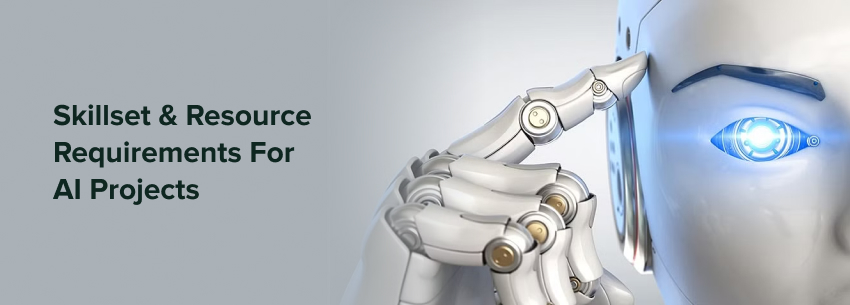
Implementing an AI system can be time-consuming, complex, and resource-intensive, necessitating the involvement of experts in the field. This may be a significant roadblock if your company still needs to get the personnel or knowledge in-house.
Overcoming this obstacle may require partnering with outside experts or investing in training programs to develop the necessary skills in-house. It is also crucial to ensure that the budget and manpower allocated to AI projects align with the organization’s long-term objectives.
Managing Change And Employee Resistance To AI Adoption:
A Significant obstacle in AI implementation is dealing with the inevitable employee resistance to change. Artificial intelligence (AI) systems can significantly alter established business practices and workflows. This can cause workers to experience anxiety and resist, as they are concerned about the possibility of automation jeopardizing their jobs.
To alleviate these concerns, employers should involve workers in the AI adoption process and equip them with the necessary education and resources to adapt to the changing landscape. One effective approach is to cultivate a culture of innovation and experimentation that empowers employees to embrace emerging technologies. This can be achieved by offering opportunities for reskilling and upskilling.
To Sum Up
Artificial intelligence has tremendous potential to revolutionize business in ways that boost productivity, sharpen judgment, and enrich the customer experience. The ideas for AI projects presented in this article can help businesses harness AI’s potential and maintain a competitive edge.
It’s important to remember that there are obstacles to consider when implementing AI, like ethical worries, data privacy and security, skill set requirements, and employee resistance to change. Businesses can overcome these obstacles and realize the full potential of AI by implementing appropriate projects.
FAQs
“Artificial intelligence” (AI) refers to the study and implementation of computer systems that replicate human intelligence in domains such as learning, problem-solving, and decision-making.
AI finds numerous applications in business transformation, enabling improvements in customer experience, process optimization, and the facilitation of data-driven decision-making.
A company can explore a multitude of AI project ideas for business transformation, depending on its unique needs and objectives. For instance, incorporating chatbots and other virtual assistants in customer service, employing predictive analytics to optimize supply chain management, and implementing machine learning algorithms to bolster fraud prevention are just a few noteworthy examples.
By pinpointing the specific use cases where AI can deliver value, businesses can effectively evaluate their data and technology requirements, as well as their capacity to support AI implementation. To streamline the AI implementation process, businesses can collaborate with external vendors or consultants for guidance.
Ethical issues surrounding data privacy and bias, job displacement due to automation, and the need for specialized skills and resources to implement and maintain AI systems effectively are just a few of the risks and challenges associated with AI implementation.
Before implementing AI solutions, businesses should thoroughly evaluate these dangers and devise plans to counteract them.
Numerous organizations across various sectors have already implemented AI to transform their businesses. American Express utilizes AI to analyze customer data and provide recommendations for products and services, whereas Amazon employs AI to optimize its supply chain and accelerate shipping times. In addition, GE Healthcare leverages AI to enhance the quality of medical imaging and facilitate accurate diagnoses.
Related Articles
-
How is Human-AI Collaboration Changing Web Development?
Technological advancements have always worked in favor of making things simpler and more manageable for humans. The recent advances in Artificial Intelligence (AI) have highlighted its applicational potential for web
-
NLP Solution Use-Cases Redefining the Business Sector
Natural Language Processing or NLP, as it commonly called, is gaining a lot of momentum these days. Organizations are using this piece of technology in various manners depending upon the
-
Top AI-driven Image Generation and Editing Tools
AI-driven image generation and editing tools have revolutionized the creative industry by allowing users to create, modify, and enhance images easily. These platforms harness the power of artificial intelligence to

